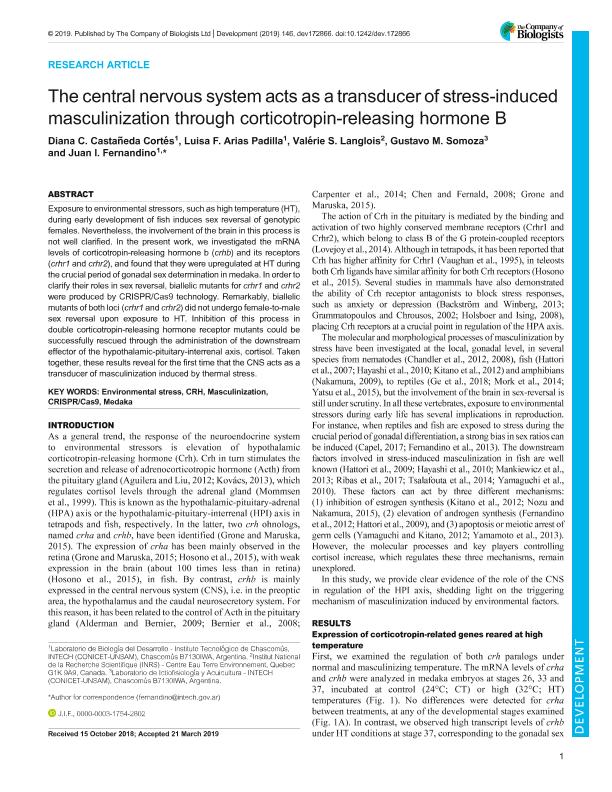Artículo
The central nervous system acts as a transducer of stress-induced masculinization through corticotropin-releasing hormone b
Castañeda Cortes, Diana Carolina ; Arias Padilla, Luisa Fernanda
; Arias Padilla, Luisa Fernanda ; Langois, Valerie; Somoza, Gustavo Manuel
; Langois, Valerie; Somoza, Gustavo Manuel ; Fernandino, Juan Ignacio
; Fernandino, Juan Ignacio
 ; Arias Padilla, Luisa Fernanda
; Arias Padilla, Luisa Fernanda ; Langois, Valerie; Somoza, Gustavo Manuel
; Langois, Valerie; Somoza, Gustavo Manuel ; Fernandino, Juan Ignacio
; Fernandino, Juan Ignacio
Fecha de publicación:
04/2019
Editorial:
Company of Biologists
Revista:
Development
ISSN:
0950-1991
Idioma:
Inglés
Tipo de recurso:
Artículo publicado
Clasificación temática:
Resumen
Exposure to environmental stressors, like high temperature (HT), during early development of fish induces sex reversal of genotypic females. Nevertheless, the involvement of the brain in this process is not well clarified. In the present work, we investigated the mRNA levels of corticotropin-releasing hormone b (crhb) and its receptors (crhr1 and crhr2), and found out that they were up-regulated at HT during the critical period of gonadal sex determination in medaka. In order to clarify their roles in sex reversal, biallelic mutants for crhr1 and crhr2 were produced by CRISPR/Cas9 technology. Remarkably, biallelic mutant of both loci (crhr1 and crhr2) did not undergo female-to-male sex reversal upon HT exposition. Inhibition of this process in double crhrs mutants could be successfully rescued through the administration of the downstream effector of the hypothalamic-pituitary interrenal axis, the cortisol. Taken together, these results revealed for the first time the participation of the CNS acting as a transducer of masculinization induced by thermal stress.
Palabras clave:
ENVIRONMENTAL STRESS
,
CRH
,
CRISPR/CAS9
,
MEDAKA
Archivos asociados
Licencia
Identificadores
Colecciones
Articulos(CCT - LA PLATA)
Articulos de CTRO.CIENTIFICO TECNOL.CONICET - LA PLATA
Articulos de CTRO.CIENTIFICO TECNOL.CONICET - LA PLATA
Citación
Castañeda Cortes, Diana Carolina; Arias Padilla, Luisa Fernanda; Langois, Valerie; Somoza, Gustavo Manuel; Fernandino, Juan Ignacio; The central nervous system acts as a transducer of stress-induced masculinization through corticotropin-releasing hormone b; Company of Biologists; Development; 146; 4-2019; 1-10
Compartir
Altmétricas



